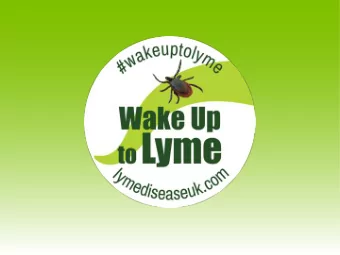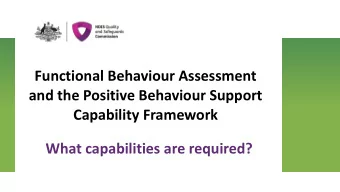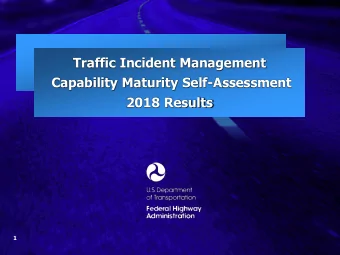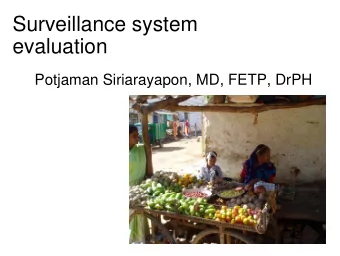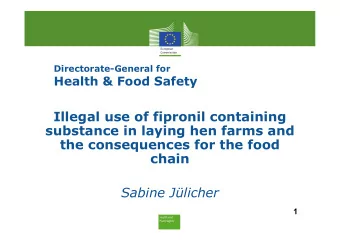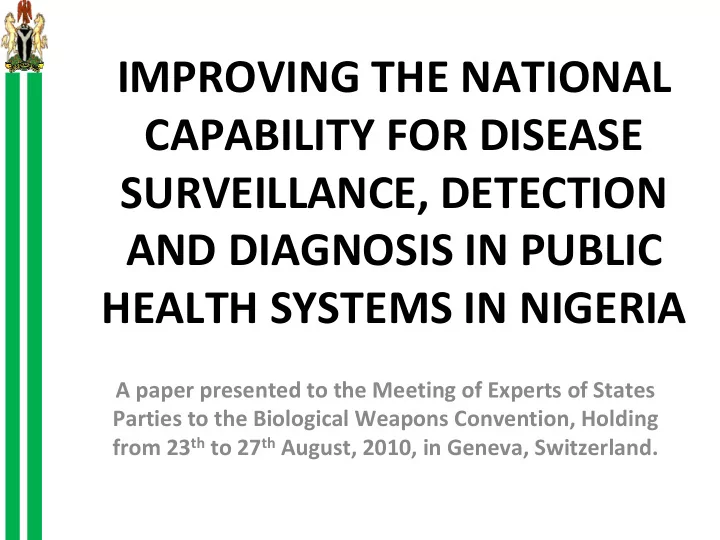
IMPROVING THE NATIONAL CAPABILITY FOR DISEASE SURVEILLANCE, DETECTION - PowerPoint PPT Presentation
IMPROVING THE NATIONAL CAPABILITY FOR DISEASE SURVEILLANCE, DETECTION AND DIAGNOSIS IN PUBLIC HEALTH SYSTEMS IN NIGERIA A paper presented to the Meeting of Experts of States Parties to the Biological Weapons Convention, Holding from 23 th to 27 th
IMPROVING THE NATIONAL CAPABILITY FOR DISEASE SURVEILLANCE, DETECTION AND DIAGNOSIS IN PUBLIC HEALTH SYSTEMS IN NIGERIA A paper presented to the Meeting of Experts of States Parties to the Biological Weapons Convention, Holding from 23 th to 27 th August, 2010, in Geneva, Switzerland.
Introduction Biological agents are a threat to both developing and industrialized countries
A key to successful defence against threat to public health is: ‐ early detection ‐ identification ‐ monitoring progression in a community.
global disease surveillance is a basic public health necessity because ongoing interactions among humans, animals, and the environment will inevitably lead to disease emergence or re ‐ emergence
Without these systems, the consequences of outbreaks of infectious disease and human exposures to agents would be great
The goal of disease surveillance is not merely to collect data for analysis, but to guide public health policy and action – “information for action”
Emergence of Pathogens There is no way to predict when or where the next important new pathogen will emerge or what its ultimate importance might be.
concerns over infectious diseases outbreaks include • often novel diseases that society is medically unprepared to handle • Unpredictable and have variable impacts on human and animal health • diseases can emerge anywhere and spread rapidly around the globe due to increasing international trade, travel, and movement of humans and animals
The most promising approach to sustainable global disease surveillance and response is to strengthen both national and regional capabilities of developing countries through international collaboration
Unfortunately most developing countries are facing a lot of challenges and obstacles due to insufficient resources, infrastructure or capacity to ensure effective health policy implementation
In addition, ‐ systems tend to be very disease ‐ specific and limits the ability to detect diseases ‐ diseases of interest do not always match the interests of human health practitioners and public health authorities
‐ In 2000 WHO ranked the Nigerian health system in 187th place out of 191 countries ‐ life expectancy in Nigeria declined to 43 years (2006) from 47 in 1990 ‐ UNDP
Establishing IDRS in Nigeria • Nigeria realized that routine disease surveillance and reporting systems were not effective in the control of most diseases • The need to address this problem led to adoption in 1998 of the Integrated Disease Surveillance and Response System (IDSR)
IDRS OBJECTIVES • provides a framework to coordinate and improve the country’s ability to control priority communicable diseases • strengthens the capacity to conduct effective surveillance activities targeting priority diseases such as Avian Influenza and Swine Fever
• Integrate multiple surveillance systems so that forms, personnel and resources can be used more efficiently and effectively, • Improve the use of surveillance data for decision making
IDRS OBJECTIVES CONTD. • Improve communication of surveillance information between and within levels of the health system, • Improve laboratory capacity in identification of pathogens and monitoring of drug sensitivity, • Increase the involvement of clinicians in the surveillance system and emphasize community participation in detection and response to priority diseases.
Since then; ‐ development of a National Emergency preparedness plan against Avian Influenza in 2005 ‐ the appearance of the natural outbreak in 2006 ‐ the control of the disease in 2007 analyzed 1,590 samples out of which 300 were positive for HPAI, as at 31 st October, 2008
Other activities • equipment procured and facilities upgraded • training of personnel in the public health sector • Institutions partnered with the WHO and Centre for Disease Control (CDC) Kenya in training personnels from Veterinary Teaching hospitals and laboratories
• Training workshops in serological techniques for the diagnosis of HPAI and Laboratory safety were also organized FAO and USAID • Field Epidemiology Training programme • Twinning programme initiated by the OIE at the National Veterinary Laboratory
Foot & Mouth Disease and Avian Influenza Laboratories Complex 20
CENTRAL DIAGNOSTIC LABORATORY
Quality Control Laboratories Complex
Nigerian Academy of Science Workshop • the surveillance infrastructure has improved but still inadequate • where capacity was available for diagnostic techniques, facilities and equipment were lacking • the need to enhanced and maintain collaborations within and between the West African regions • a disconnect between the human medical and Veterinary public health activities
unanimous agreement that the current disease surveillance system in Nigeria needs to be strengthened in order to meet up with the challenges of the current threats of disease outbreaks.
Conference Recommendations • National Centre for Disease Control in Nigeria to integrate and coordinate all surveillance activities involving outbreaks of diseases in humans and animals. • National Research Commission to oversee and coordinate all activities involving human, animal and plant research in Nigeria
• Enhance Efforts towards strengthening global laboratory network with integrated components for zoonotic disease diagnosis and reporting. • Develop new and improve existing interdisciplinary educational and training programs • establish a technical multi ‐ disciplinary panel to review current scientific information on drivers of disease emergence.
‐ Provide incentives for disease outbreak notification and also reduce the social and economic repercussions for such early reporting ‐ Convene routine meetings of representatives from the public, private, and civil sectors to help build trust towards useful information
CONCLUSION • The possibilities of another panzootic of HPAI or any other disease cannot be overruled. • The pandemic influenza of moderate severity could reduce global gross domestic product by 2.0 percent, while a severe flu pandemic would drop global GDP by nearly 5%, or more than $3 trillion – World Bank.
‐ Nigeria has recognized the seriousness of this situation and is focused on providing prompt and qualitative diagnostic and surveillance services ‐ Nigeria’s surveillance and reporting systems have improved significantly and many lessons can be learnt from this
There is need to do a lot more not only for early detection of the disease but also to monitor the ecology and epidemiology of the disease in order to manage it effectively
As a Country we can with all certainty state that we rose to the challenge of the time especially in relation to the recent outbreak of the Avian Influenza disease in Nigeria.
“Of the 84 countries the World Bank has assisted in the control of the deadly H5N1 virus, Nigeria is the only country with a success story.” Mr. Onno Ruhl ‐ World Bank Country Director for Nigeria
This did not come easy, it involved sacrifice and passion put together to achieving this feat. However, we acknowledge that the Public Health system in Nigeria is currently facing a lot of challenges
CHOLERA OUTBREAK IN NIGERIA
• According to WHO more than 3,000 cases of cholera in northern Cameroun, Nigeria and Niger • An official anti ‐ epidemic in Nigeria indicated that the cholera epidemic has killed 231 people in 11 states in the northeast of the country this year and infected more than 4500 others. • More than 163 people, including 111 children, have died of lead poisoning in Nigeria over the past five months
The recent sectarian crisis in some parts of the country has also worsened the surveillance situation and increased the potential threat of intentional or accidental use of biological agents
Nigeria urgently requires support in the provision of laboratory facilities to reduce these threats and to increase the likelihood that the diagnosis of any disease outbreak is correct, and that public health action will be efficient and appropriate.
Nigeria continues to reaffirm its commitment to ensure the full realizations of the objectives of the Biological Weapons Convention (BWC) and attaches particular importance to the implementation of article X of the BWC which provides for assistance and technical cooperation to State Parties against biological weapons attack.
Nigeria requests for technical assistance • Provision of a Bio ‐ Safety Level (BSL) 3 laboratory to strengthen the capacity to protect the repository in the country • Equipping the laboratory for molecular diagnosis of highly pathogenic organisms • Building capacity through training programmes, joint cooperation projects and workshopss
Nigeria looks forward to receiving support from our partners at this meeting
Thank you for listening
CONTACT: DR. NWANKPA NICK ‐ NATIONAL VETERINARY RESEARCH INSTITUTE VOM. PLATEAU STATE, NIGERIA nicknwankpa2004@yahoo.com DR. OJEMBE CHRIS – FEDERAL MINISTRY OF HEALTH, ABUJA, NIGERIA akanemeze1@yahoo.com
Recommend
More recommend
Explore More Topics
Stay informed with curated content and fresh updates.
